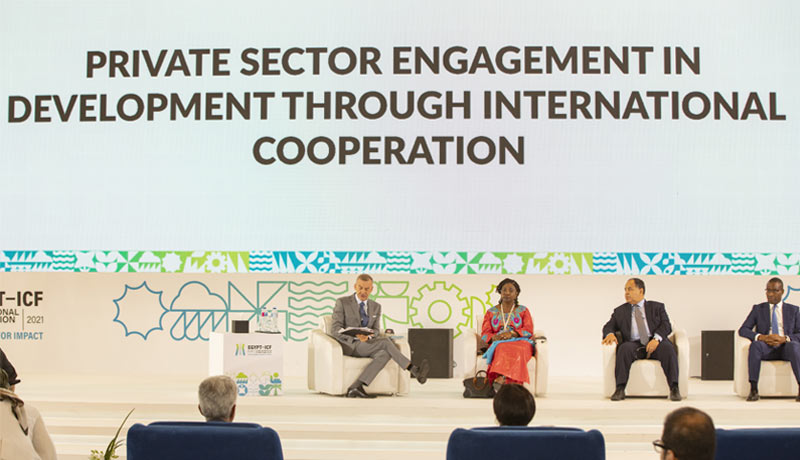
Mobilizing the private sector is critical to bridging the $2.5 trillion Sustainable Development Goals (SDG) financing gap, according to Egypt’s Minister of Finance, H.E. Dr. Mohamed Maait, at the inaugural Egypt International Cooperation Forum (Egypt-ICF) in Cairo.
Speaking during a panel session entitled, ‘Private Sector Engagement in Development Through International Cooperation’, Dr. Maait said: “The mobilization of private finance for sustainable development has become an important function of the multilateral development system.”
The panel said that more global funding should be aligned in support of the 2030 Agenda for Sustainable Development, given the existing trillion-dollar SDG financing shortfall.
Addressing the panel, Jay Collins, Vice Chairman of Corporate and Investment Banking at Citi, said: “The need of the hour is to move the needle for development purposes, which may take longer due to the global COVID situation. Official Development Assistance (ODA) financing has become strained with the pandemic and its aftermath, resulting in fiscal retrenchment in developed countries.”
Highlighting the need for more private sector participation, H.E. Amadou Hott, Minister of Economy, Planning and Cooperation of Senegal, said: “Business-friendly reforms are paramount to drive private sector activity in all fields. Business reforms are important, and governments need to announce tax reforms to widen the tax base and lower the tax rates.”
Emphasizing the point, EstherineLisinge-Fotabong, Head of the African Union Development Agency (AUDA-NEPAD) delegation, stressed: “A mindset change that is policy-oriented is important in the way business is conducted.”
“Private sector engagement in development is vital. It is all about people and not about money. The private sector has a critical role to play in this transformation, as it contributes to the creation of employment and overall growth.”
Delivering her comments to the panel on the platform of the Cairo stage, Stephanie von Friedeburg, Senior Vice President – Operations at the International Finance Corporation (IFC), said: “To tackle the world’s biggest development issues, we need more bankable projects, technology-driven solutions, and blended finance tools. Those will get us a long way.”
“Despite the significant accomplishments of Arab development in the past decades, achieving the principles of comprehensive development still requires more effort. We need to progress towards laying a solid foundation for cooperation and to build partnerships between international and regional financial institutions, beneficiary countries, the public and the private sectors,” elaborated Bader M. Alsaad, Director General of the Arab Fund for Economic and Social Development.
“I agree that the mindset needs to change from a lender to a mobilizer – like a risk taker. While some progress has been made, there is still a long way to go, which will allow the institutional community to come in,” shared HajeSchütte, Senior Counsellor and Head of Financing for the Sustainable Development Division of the OECD Development Co-operation Directorate.
Tidjane Thiam, Executive Chairman of Freedom Acquisition Corp. 1, said: “The availability of capital is not the issue. The crux of the matter is to find a way to drive the capital to the ground level. This development will happen only through a vibrant SME ecosystem. We need equity investments.”
Alain Pilloux, Vice President – Banking at the European Bank for Reconstruction and Development (EBRD), expressed: “More private sector involvement is key to growth. It all boils down to a stable political environment. While the governments need to take on their share of responsibilities, the private sector and the multilateral development agencies need to complement this.”